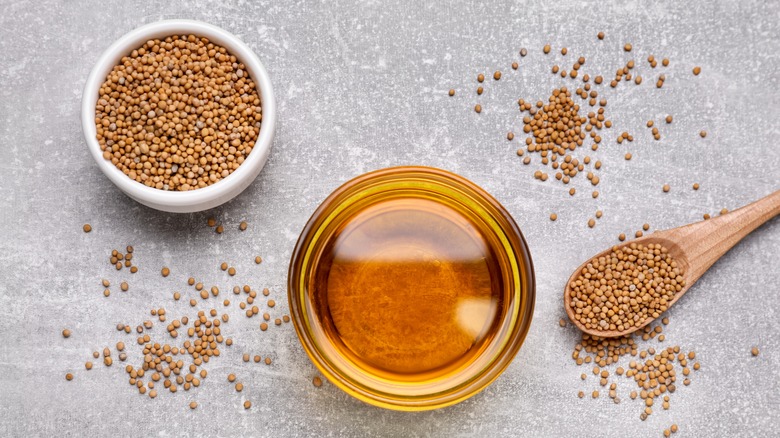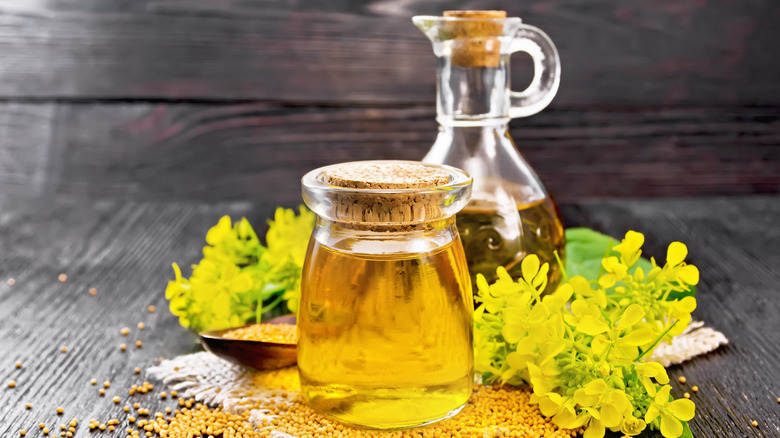Is It Actually Dangerous To Cook With Mustard Oil?
Americans enjoy access to a wide selection of cooking oils, but there's one option whose absence from grocery store shelves has stirred up controversy since it was first banned back in the 1990s. Mustard oil is extracted from mustard seeds and is a pungently flavorful cooking oil commonly associated with Northern India, Bangladesh, Pakistan, China, and Russia. The oil has been used in these regions for hundreds of years, shaping the local cuisine in unmistakable ways. So, why aren't Americans allowed to cook with it?
Back in the 1950s, researchers performed a study on rats aimed at understanding the health effects of rapeseed oil. Rapeseed and mustard seed are both in the Brassicaceae family but, more importantly, they both contain relatively high levels of erucic acid. From that study, researchers discovered that high levels of erucic acid increased the rats' risk of heart disease. This was the impetus for creating canola oil, which is an artificially bred variant of rapeseed specifically designed to reduce erucic acid content.
You can still find mustard oil for sale in the U.S. today, but it's labeled for external use only, meaning you aren't supposed to eat it. That hasn't stopped people from continuing to cook with it though. In recent years, the ban has come under some criticism alongside a significant increase in culinary use. With so many other countries still cooking with it legally, many people are confused as to why the U.S. is left in the dark.
How mustard oil is used around the world
Accurately chronicling all the various ways people use mustard oil could fill an entire book, so we'll stay nice and generalized here. There are two kinds of mustard oil that are commonly produced. In South Asian countries like India and Bangladesh, black mustard seeds are more common, while brown mustard seeds are popular in North and Central Asian countries such as China and Russia. Like most cooking oils, mustard oil is a typical choice for sauteing vegetables and meats but can also be used to deep fry food thanks to a high smoke point. Mustard oil is a great way to add flavor to curries and is added in small amounts to marinades as well.
Mustard oil is also a key ingredient used in Ayurveda, the ancient Indian yoga of nutrition dating back to Vedic times. As a type of Ayurvedic salve, mustard oil is said to reduce joint pain, improve blood circulation, and treat cracked skin. As a cooking ingredient, it's said to promote a healthy appetite. Our understanding of nutrition has evolved over the years, but Ayurveda was well ahead of its time as a nutritional science when it first arose 3,000 years ago.
Like many other religions, Hinduism uses oil in some of its religious rites, and mustard oil is a particularly popular choice in the region. It can be offered in a symbolically sacrificial way, and mustard oil lamps are lit inside during festivals to symbolize cleanliness.
If you choose to cook with mustard oil, here's what you need to know
The FDA does not approve of consuming mustard oil due to the increased risk of heart disease. That said, the government's disapproval hasn't stopped people from eating rare steaks either. If you're considering eating mustard oil, you ought to know the risks so you can make an informed decision.
One criticism of the 1950s study is that it used rats instead of humans as its test subjects. However, Indian researchers have done studies on humans and found increased rates of heart disease among people who consumed higher amounts of mustard oil, via the National Library of Medicine. A tangential data point worth considering is that South Asians living in the U.S. are four times more likely to develop heart disease (specifically, ASCVD) than others in the area and that increased heart risk is well-recorded in other countries. Let's be clear, it would be an egregious mischaracterization to lay all of the blame for this at the feet of mustard oil, but with so little research to go off of, this does raise some red flags.
In direct contradiction to U.S. guidelines, Indian cardiologists point to mustard oil as being great for your heart's health due to the presence of healthy monounsaturated and omega fats, according to Times of India. Nutritional information is becoming increasingly contradictory, and mustard oil seems to be another victim of this confusion, so choose for yourself if the risk is worth it.


